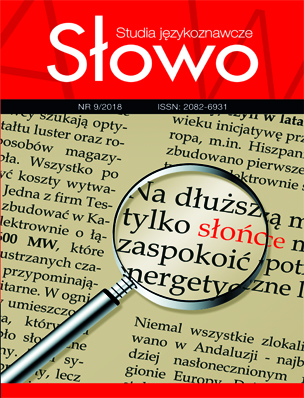Nazwy pokojów zagadek jako element gier językowych między nadawcą a odbiorcą tekstu reklamowego
DOI:
https://doi.org/10.15584/slowo.2018.9.03Słowa kluczowe:
escape rooms, language game, advertising test, playing with a language, name as a textAbstrakt
Escape rooms are a new form of a pastime. In Poland they have become growingly popular. Escape rooms originate from the USA and are dated back to the 1990s. The task of the game participants is to get out of the room in which they have been locked. In order to leave the room the participants must solve a series of previously prepared puzzles or riddles. The presence of onomastic games in language communication derives from the ludic, emotional, and semantic aspect, and the result is the acceptance of a name within a certain circle, paying attention to the object and its use for a specific purpose – attracting the largest possible number of customers, getting the recipients interested in the offer. Wittgenstein proposed a list of language game, which is still open. It seems that (semantic and structural) creation, functioning, and purposefulness of using many of the discussed chrematonyms may be viewed from the aspect of at least some of the games listed by him, just to mention the solving of riddles, speculating or joking. The interest in a name (and in consequence in an object) and the proper interpretation of the contents provided do not differ from guessing, presuming, reading the hidden information, expectations and meanings related to an object, to which the name has been assigned.Downloads
Bibliografia
Caillois R., 1997, Gry i ludzie, Warszawa.
Cieślikowa A., 1993, Nazwy własne w różnych gatunkach teksów literackich [w:] Onomastyka literacka, red. M. Biolik, Olsztyn, s. 33–39.
Filip G., 2003, Gry językowe Jana Lama, Rzeszów.
Grochowski M., 1993, Konwencje semantyczne a definiowanie wyrażeń językowych, Warszawa.
Jarzębski J., 1977, O zastosowaniu pojęcia „gra” w badaniach literackich [w:] Problemy odbioru i odbiorcy, red. T. Bujnicki, J. Sławiński, Wrocław, s. 28–29.
Jędrzejko E., 1997, Strategia tekstotwórcza a gry językowe w literackich nazwach własnych [w:] Gry w języku, literaturze i kulturze, Warszawa, s. 65–68.
Jędrzejko E., Żydek-Bednarczuk U., 1997, O pojęciu gra i jego leksykalnych wykładnikach w aspekcie składni semantycznej [w:] Gry w języku, literaturze i kulturze, Warszawa, s. 123–124.
Mrózek R., 2004, Nazwy własne jako przedmiot badawczy onomastyki [w:] Nazwy własne w języku, kulturze i komunikacji społecznej, red. R. Mrózek, Katowice, s. 9.
Rutkowski M., 2016, Medioonomastyka w ramach mediolingwistyki, „Prace Językoznawcze” XVIII/3, s. 171–180.
Rutkiewicz-Hanczewska M., 2013, Genologia onimiczna, Poznań.
Rzetelska-Feleszko E., 1997, Przedmowa [w:] Polskie nazwy własne. Encyklopedia, Warszawa–Kraków 1998, s. 9.
Siwiec A., 2012, Nazwy własne obiektów handlowo-usługowych w przestrzeni miasta, Lublin.
Skowronek K., Rutkowski M., 2004, Media i nazwy. Z zagadnień onomastyki medialnej, Kraków.
Wittgenstein L., 1972, Dociekania filozoficzne, Warszawa.
Zdunkiewicz D., 1993, Akty mowy [w:] Encyklopedia kultury polskiej XX wieku. t. 2: Współczesny język polski, red. J. Bartmiński, Wrocław, s. 259–270.
Pobrania
Opublikowane
Jak cytować
Numer
Dział
Licencja
Prawa autorskie (c) 2018 Słowo. Studia językoznawcze

Utwór dostępny jest na licencji Creative Commons Uznanie autorstwa – Użycie niekomercyjne 4.0 Międzynarodowe.


